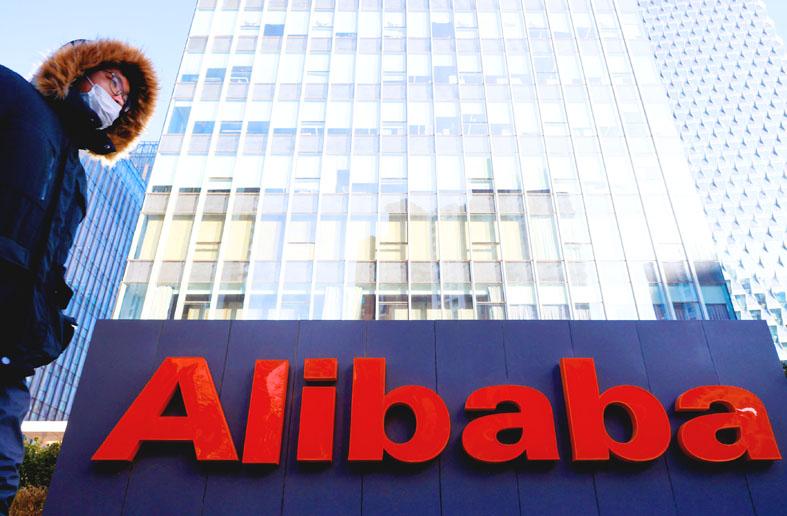China’s largest e-commerce operator Alibaba Group Holding Ltd (阿里巴巴) is planning to offer its fast-growing bargains service on rival Tencent Holdings Ltd’s (騰訊) WeChat (微信) messaging platform in a major concession to regulators seeking to crack down on monopolies in the Internet sphere, people with knowledge of the matter said.
Alibaba and Tencent have long excluded each other’s services from their platforms, creating so-called walled gardens within their ecosystems.
Alibaba is now planning to set up a Taobao Deals (淘寶特價版) lite app on Tencent’s WeChat, and has already invited some merchants to participate, the people said.

Photo: Reuters
Selling through the WeChat super-app means the merchants would be able to accept payments made through WeChat Pay (微信支付), a service that had been barred on Alibaba’s marketplaces, the people said.
Tencent would have to approve the listing of any in-app platforms and it is not clear if the company plans to do so with Taobao Deals lite app.
More than 1 billion people use WeChat, which has evolved beyond chatting to offer ride-hailing, online shopping and payments on its platform.
The move is one of the clearest indications that Beijing’s crackdown on monopolies is taking effect. China’s antitrust watchdog has made regulating Internet firms one of its top priorities, cracking down on monopolistic behavior from alliances that squeeze out smaller rivals to forced exclusive arrangements and predatory pricing.
Chinese President Xi Jinping (習近平) on Monday called for greater oversight of the “platform” economy, signaling that Beijing is preparing to amplify its campaign against its tech giants.
Alibaba and Tencent have created separate fiefdoms within China’s tech industry through their patronages, buying up promising start-ups and investing in others to expand their reach. Only a few companies — TikTok owner ByteDance Ltd (字節跳動) is a notable exception — have thrived without forming an alliance with either giant.
Tencent has previously been accused of barring services by rival tech companies on its platforms. ByteDance last month sued Tencent, alleging its rival had contravened antitrust laws by blocking access to content from Douyin (抖音), TikTok’s Chinese twin, on WeChat and QQ.
Meanwhile, Alibaba’s UC Browser vanished from China’s largest app stores after China Central Television blasted the popular mobile browser along with other services for failing consumers.
App stores run by Huawei Technologies Co (華為) and Xiaomi Corp (小米) were among the local app stores that have since pulled the app, although Apple Inc continues to offer UCWeb for iOS users.
The Alibaba unit pledged to set up a dedicated team to look into the allegations.

Taiwan Transport and Storage Corp (TTS, 台灣通運倉儲) yesterday unveiled its first electric tractor unit — manufactured by Volvo Trucks — in a ceremony in Taipei, and said the unit would soon be used to transport cement produced by Taiwan Cement Corp (TCC, 台灣水泥). Both TTS and TCC belong to TCC International Holdings Ltd (台泥國際集團). With the electric tractor unit, the Taipei-based cement firm would become the first in Taiwan to use electric vehicles to transport construction materials. TTS chairman Koo Kung-yi (辜公怡), Volvo Trucks vice president of sales and marketing Johan Selven, TCC president Roman Cheng (程耀輝) and Taikoo Motors Group

Among the rows of vibrators, rubber torsos and leather harnesses at a Chinese sex toys exhibition in Shanghai this weekend, the beginnings of an artificial intelligence (AI)-driven shift in the industry quietly pulsed. China manufactures about 70 percent of the world’s sex toys, most of it the “hardware” on display at the fair — whether that be technicolor tentacled dildos or hyper-realistic personalized silicone dolls. Yet smart toys have been rising in popularity for some time. Many major European and US brands already offer tech-enhanced products that can enable long-distance love, monitor well-being and even bring people one step closer to

RECORD-BREAKING: TSMC’s net profit last quarter beat market expectations by expanding 8.9% and it was the best first-quarter profit in the chipmaker’s history Taiwan Semiconductor Manufacturing Co (TSMC, 台積電), which counts Nvidia Corp as a key customer, yesterday said that artificial intelligence (AI) server chip revenue is set to more than double this year from last year amid rising demand. The chipmaker expects the growth momentum to continue in the next five years with an annual compound growth rate of 50 percent, TSMC chief executive officer C.C. Wei (魏哲家) told investors yesterday. By 2028, AI chips’ contribution to revenue would climb to about 20 percent from a percentage in the low teens, Wei said. “Almost all the AI innovators are working with TSMC to address the

Malaysia’s leader yesterday announced plans to build a massive semiconductor design park, aiming to boost the Southeast Asian nation’s role in the global chip industry. A prominent player in the semiconductor industry for decades, Malaysia accounts for an estimated 13 percent of global back-end manufacturing, according to German tech giant Bosch. Now it wants to go beyond production and emerge as a chip design powerhouse too, Malaysian Prime Minister Anwar Ibrahim said. “I am pleased to announce the largest IC (integrated circuit) Design Park in Southeast Asia, that will house world-class anchor tenants and collaborate with global companies such as Arm [Holdings PLC],”